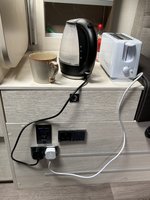wildebus
Full Member
- Posts
- 8,752
- Likes
- 14,212
Well, it is like Mark says below ....Well if there are conflicts regarding electrics. Ask the man. WBus. David what’s your take on earthing inverters. Brian
It is easy to read a convincing argument for both options. And the arguments change and vary depending on if your battery ground is connected to chassis ground.There are arguments for and against, both seem to make sense too
I tend to think of it similar to home products - if the casing is metal, ground it, if not, not so important.
But I would say go with any recommendations from the manufacturer if they provide them. For example, if you take a Victron Phoenix Inverter, they are plastic cased but the manual tells you to connect the inverter to chassis with a cable at least half the gauge of the supply cables (which is pretty heavy cable and seems a bit OOT?)

